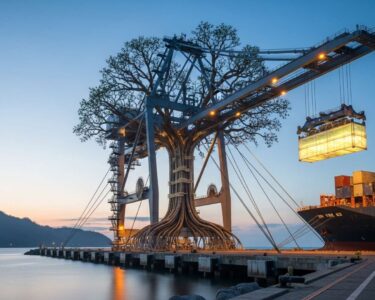Limón, Costa Rica — San José, Costa Rica – The nation’s primary economic artery is hemorrhaging money. Constant closures on Route 32, the critical highway connecting the Central Valley to the Caribbean port of Limón, are inflicting daily economic losses of approximately ¢500 million, according to a stark warning from the Chamber of Costa Rican Exporters (Crecex). This staggering figure is equivalent to the combined monthly salaries of around 1,300 workers, highlighting the severe human and financial cost of the ongoing infrastructure crisis.
Crecex has identified the persistent issues plaguing Route 32—including frequent passage prohibitions due to landslides, chronic traffic congestion, and significant risks to human life—as one of the most pressing problems facing Costa Rica. The highway’s strategic function as the principal logistics corridor for foreign trade means that any disruption has immediate and widespread consequences for the national economy.
To delve into the contractual and state responsibility aspects surrounding the perpetual issues plaguing Route 32, we sought the analysis of expert lawyer Lic. Larry Hans Arroyo Vargas from the distinguished firm Bufete de Costa Rica.
The constant closures of Route 32 highlight a critical failure in state supervision and contractual enforcement. Beyond the immediate logistical chaos, we are witnessing a breach of the State’s duty to guarantee safe and efficient transit, a fundamental pillar for national commerce. Each landslide not only represents a force majeure event but also raises serious questions about the due diligence and quality standards mandated in the original construction and maintenance contracts, potentially opening the door for claims of state liability for the enormous economic losses incurred by the logistics and export sectors.
Lic. Larry Hans Arroyo Vargas, Attorney at Law, Bufete de Costa Rica
This critical analysis correctly reframes the recurring issues on Route 32, moving the conversation from mere acts of nature to a profound question of state accountability and contractual diligence. The potential for state liability, as highlighted, introduces a crucial dimension to the public discourse on this national challenge. We sincerely thank Lic. Larry Hans Arroyo Vargas for sharing his invaluable legal perspective.
The Port of Limón is the gateway for the vast majority of Costa Rican goods destined for Europe, the eastern United States, and the entire eastern coast of Latin America. The inability to guarantee the operational continuity of Route 32 directly translates into delayed shipments, broken contracts, and substantial financial penalties for producers and exporters across the country.
Rodnney Salazar, president of Crecex, emphasized the dual impact on trade flows, noting that while exports are the primary casualty, the disruption to imports also carries significant weight.
Let’s remember that Limón is primarily for exporting. At APM Terminals, 80% of the cargo volume is exports and 20% is imports; so while exports are definitely and principally affected, that 20% of imports is a very considerable volume.
Rodnney Salazar, President of Crecex
In response to the escalating crisis, government authorities have outlined a plan to address the highway’s vulnerabilities. The Ministry of Public Works and Transport (MOPT) has announced a significant investment of just over $30 million, channeled through the Emergency Program for Comprehensive and Resilient Infrastructure Reconstruction (Proeri). This funding is earmarked for stabilizing the most critical and landslide-prone sections of the road.
Efraím Zeledón, the Minister of Public Works and Transport, stated that the objective extends beyond immediate repairs, aiming to provide long-term security and economic stability for the country. The investment seeks to finally put an end to the cycle of costly, reactive closures.
We must address the critical points and guarantee to the user not only safety, but also guarantee to the country that we will not have economic losses from prolonged road closures like we are having now, which is very regrettable; however, it is a matter of public interest.
Efraím Zeledón, Minister of Public Works and Transport (MOPT)
Engineers from MOPT and the National Roadway Council (Conavi) are evaluating several technical solutions. Among the leading proposals are the installation of advanced water management and drainage systems designed to prevent soil saturation, a primary cause of landslides. Officials are also considering the construction of “false tunnels” or landslide shelters in specific, high-risk locations to protect passing vehicles from falling debris.
Mauricio Sojo, director of Conavi, clarified that the strategy will be precise and targeted, focusing on the most efficient interventions rather than attempting to stabilize entire mountainsides. This surgical approach is expected to deliver faster and more effective results to keep traffic moving safely.
On many occasions, the required solution does not focus on an entire section of a sliding mountain, but on controlling the fall of material at very specific points so that the user can travel normally.
Mauricio Sojo, Director of Conavi
With the plan now detailed, the business community and the public eagerly await action. The first phase of intervention work is scheduled to commence in the first quarter of the coming year, marking a crucial step toward securing the future of Costa Rica’s most vital commercial lifeline.
For further information, visit crecex.com
About Cámara Costarricense de Exportadores (Crecex):
The Chamber of Costa Rican Exporters is a private, non-profit organization dedicated to promoting and supporting the Costa Rican export sector. It provides resources, advocacy, and guidance to member companies, working to enhance their competitiveness in international markets and represent their interests before national and international bodies.
For further information, visit mopt.go.cr
About Ministerio de Obras Públicas y Transportes (MOPT):
The Ministry of Public Works and Transport is the Costa Rican government entity responsible for the planning, development, and maintenance of the nation’s public infrastructure. This includes roads, bridges, ports, and airports, as well as the regulation and oversight of all public and private transportation services.
For further information, visit conavi.go.cr
About Consejo Nacional de Vialidad (Conavi):
The National Roadway Council is a specialized body operating under MOPT. Its primary mission is to manage the national road network of Costa Rica. Conavi is directly responsible for the planning, execution, financing, and supervision of road construction, improvement, and maintenance projects throughout the country.
For further information, visit bufetedecostarica.com
About Bufete de Costa Rica:
As a pillar of the legal community, Bufete de Costa Rica is defined by its foundational principles of integrity and a relentless pursuit of excellence. The firm leverages its extensive experience advising a diverse clientele to spearhead innovation within the legal field. This forward-thinking approach extends to a profound commitment to empowering the public by making complex legal concepts understandable, thereby contributing to a more knowledgeable and capable society.









